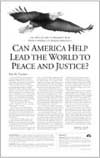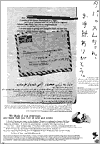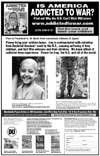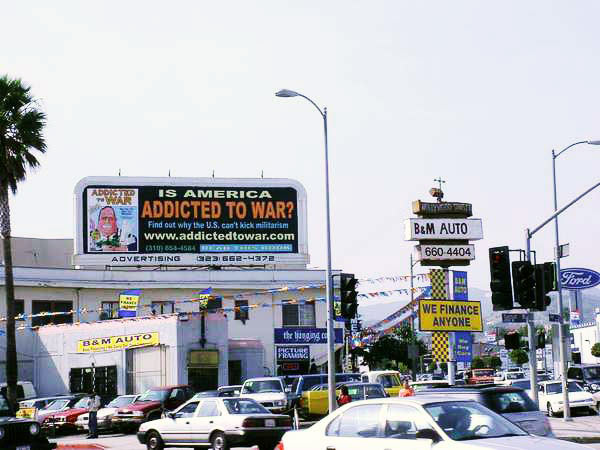We cannot change the past, but we can change our attitude toward it. Uproot guilt and plant forgiveness. Tear out arrogance and seed humility. Exchange love for hate --- thereby, making the present comfortable and the future promising.
Maya Angelou
Updated:
The GPC Advertisements
The Global Peace Campaign initially produced the six newspaper advertisements in the right sidebar, that were published in both the US and Europe. Click on each ad to see large size versions of the ads.
Below is the Addicted To War billboard which went up on Wednesday, March 19th, 2002, around the same time the United States began bombing the people of Iraq again. These pictures were taken by Andy Manoff, who designed the billboard and arranged to have it go up at this great location where Hollywood Blvd., Sunset Blvd., Virgil and Hillhurst intersect, just across from the Vista Theatre in Hollywood / Silver Lake, Los Angeles.
Below is a short movie about Addicted To War that includes Yumi speaking at a peace rally in San Francisco on Feb. 18th, 2003 (4min 6sec, 8.9 MB).
The following story about Addicted To War appeared in the Yomiyuri Shimbun, one of the popular English newspapers published in Japan
The U.S. War Machine In Black And White
2002-12-30 Asami Nagai and Yomiuri Shimbun for Yomiuri
30 December 2002
On page 49 of Joel Andreas' cartoon book Addicted to War (AK Press), four well-fed men use the ideals of democracy, freedom, justice and peace to justify U.S. wars. In the next frame, the same men--representing bankers, corporate executives, politicians and generals--grin as they think about their true goals: money, markets, natural resources and power.
A lot of people may think that foreign policy has little to do with their daily lives, but the opposite is true. To understand why, just turn to page one, where a wide-eyed woman complains about the huge amount of money the U.S. government has taken out of her pay cheque. Later, her son asks her to help raise money to buy toilet paper for his school, followed by a scene at a school board meeting where the principal explains that the school receives very little assistance from the federal government. The author uses the 2002 fiscal year federal discretionary budget to show how the government used the money they take in--50.5 percent goes to military spending, and only 8 percent to education.
And that's just the beginning. The book forges on, explaining that the true history of U.S. foreign policy is entirely different from what is usually taught in schools or reported in the mainstream media.
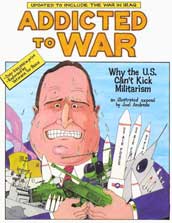 Addicted to War, originally published in 1992, was updated and reprinted in April in the United States, followed by a Japanese translation in October. In two months, more than 20,000 Japanese copies have been sold, while 40,000 copies of the English version have been sold in the United States.
Addicted to War, originally published in 1992, was updated and reprinted in April in the United States, followed by a Japanese translation in October. In two months, more than 20,000 Japanese copies have been sold, while 40,000 copies of the English version have been sold in the United States.
"The sale of 20,000 copies in two months is surprising," said Ryoji Ueno of Godo-shuppan Corp., which published the book in Japan. "A lot of readers buy several extra copies and give them to their friends as gifts. This book, written by an American, is a good textbook, helping Japanese citizens understand why the United States appears so eager to wage war."
The updated edition of Addicted to War was planned as one powerful tool in the peace movement. Earlier this year, Yumi Kikuchi, 40, a Japanese writer, environmentalist and peace activist, started a second peace campaign to donate one book to each U.S. school. A donation of 1,000 yen will be used to donate one copy to one school.
Kikuchi received her copy of the original Addicted to War from Frank Dorrel, a Vietnam War veteran and peace activist. Dorrel came across the book by chance in 2000, and hired a private detective to find the author. He eventually tracked down Andreas, a sociologist finishing his Ph.D. at the University of California, Los Angeles, and asked him to update the book. Then came the Sept. 11, 2001 attacks.
Kikuchi, however, became involved in the peace movement only after the attacks. Before that, she was more active in conservation issues.
Immediately after seeing the attacks, and hearing U.S. President George W. Bush declare his "War on Terrorism," she e-mailed her friends to tell them her worries about a new war.
"Then I received a reply from an American friend who attached a letter from a former marine addressed to President Bush," Kikuchi said. "My friend said, 'This is a very calm letter. How about collecting donations and printing it in the paper?'" She agreed, and on Sept. 15, 2001, the Global Peace Campaign started up in cyberspace.
"None of my American friends wanted war, but they said it was extremely difficult for them to say so in the United States," Kikuchi said. "Since I'm not a U.S. citizen, I thought I could do that part. Printing the letter in a major newspaper (as an ad) has great significance, as many Americans can see it."
Kikuchi obtained permission from the writer of the letter in question and started soliciting donations for the 140,000 dollars ad fee. Within just two weeks, Kikuchi raised the money she needed to print the ad. The group, along with Veterans for Peace, a non-profit organization dedicated to the abolishment of war, published it on Oct. 9, 2001, in The New York Times. Thanks to Japanese media coverage, another 10 million yen was raised. In the end, donations came from about 3,000 individuals from 16 countries, paying for ads in The Los Angeles Times, an Italian newspaper and 10 Persian-language periodicals.
"We received many responses to the ad," Kikuchi said. "And of course many of those were hate mail. But about 60 percent of the responses were positive and supportive."
Kikuchi said she understands the feeling of those who write nasty messages. "They were still panicking; their pride was crushed. Some lost friends in the attacks," she said. "But, I have the impression that Americans are generally ignorant about what their government has been doing to foreign lands.
"When I visited U.S. cities for four months last year (after the attacks), I watched the media every day. It was totally dominated by news on U.S. retaliations against the Taliban and how things were improving in Afghanistan. After seeing that over and over, even I felt (the bombings in Afghanistan) were a good thing," she said.
"There was no coverage of 'collateral damage,' no mention of how many were killed or who they were," Kikuchi continued. "But the U.S. media would report a single death of a U.S. soldier on the front page. Of course, it's sad to lose an American life. But the gap between the coverage of Afghans and that of Americans is so huge. If they aren't told what is really going on in other parts of the world, Americans are deprived of the opportunity to form negative opinions of wars."
Kikuchi said she likes the book because the history is not made up. "All the sources are listed at the end of the book," she said.
"The book clearly reveals who pays for wars, who fights in wars, who dies and who reaps the profits," she said. "It became clear to me it would be better to sell this book than to spend so much money on an ad with only one day of life. So I called Dorrel, offered to help him, and immediately sent 5,000 dollars of my own money to help cover printing costs."
"I believe the power of this book is how easy it is for the average person to read it and begin to understand what the United States has really been doing with its foreign policy," Dorrel told The Daily Yomiuri. "Wars, interventions, covert operations...all of this has been done on behalf of U.S.-owned corporations and big businesses. Yet, amazingly, most Americans do not know any of this."
 Kikuchi especially wants young people to read it now that the new version is available. "If they examine all the information on pro-war motives and antiwar sentiments and still want to join the military, that's totally fine. But it's unfair for young men and women to make such an important decision without all the facts," Kikuchi said.
Kikuchi especially wants young people to read it now that the new version is available. "If they examine all the information on pro-war motives and antiwar sentiments and still want to join the military, that's totally fine. But it's unfair for young men and women to make such an important decision without all the facts," Kikuchi said.
For Kikuchi, who worked as a bond trader for a U.S. bank for four years, the attacks on the United States completely destroyed her old identity.
"I loved America, still do. My husband holds a U.S. green card," she said. "After I began to see the reality of the world, I realized that I belong to an extremely wealthy privileged class, though I am not financially rich. I trample many others just by maintaining an ordinary Japanese standard of living. Now, I really want to use my energy and potential to turn the world into a fairer place to live."
Kikuchi said people can be addicted to money, just as they can be addicted to war. "It's fun to earn a profit," Kikuchi cheerfully said. "Money junkies tend to seek more and more, and eventually begin to convert the value of everything, including people, into terms of money."
Kikuchi herself was on the verge of money addiction, when she visited Belize and happened to get involved in activities to save the rain forest there. Her life took a new turn. At 28, she left the bank to become a full-time conservationist.
"Human relationships in the financial world were quite superficial," Kikuchi recalled. "Environmental activists are totally different. In the ad campaign, they provided me with whatever help and encouragement they could."
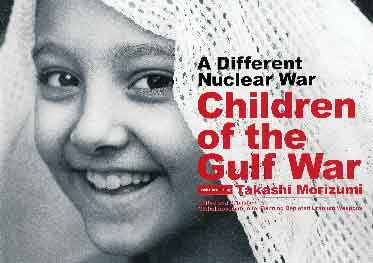 Kikuchi's campaign goes on. In early January, she plans to publish another ad in The New York Times. The ad reads: "Can You Let More Iraqi Children Die?" followed by sentences like, "Do you know that the 1991 Gulf War was a war of mass destruction? It was also a nuclear war--radioactive DU (depleted uranium) weapons were used."
Kikuchi's campaign goes on. In early January, she plans to publish another ad in The New York Times. The ad reads: "Can You Let More Iraqi Children Die?" followed by sentences like, "Do you know that the 1991 Gulf War was a war of mass destruction? It was also a nuclear war--radioactive DU (depleted uranium) weapons were used."
The eye-catching photo of a smiling Iraqi girl, who lost her hair due to treatment for leukemia, was provided by Japanese photographer Takashi Morizumi.
"The Japanese are not free from blame," Kikuchi said. "As long as our government is providing support for U.S. wars, we're part of it."
Now, rejoicing at Addicted to War's excellent start, Kikuchi is preparing a Korean version, while Dorrel is in charge of German and Spanish versions.
"Addicted to War" is available at www.addictedtowar.com


